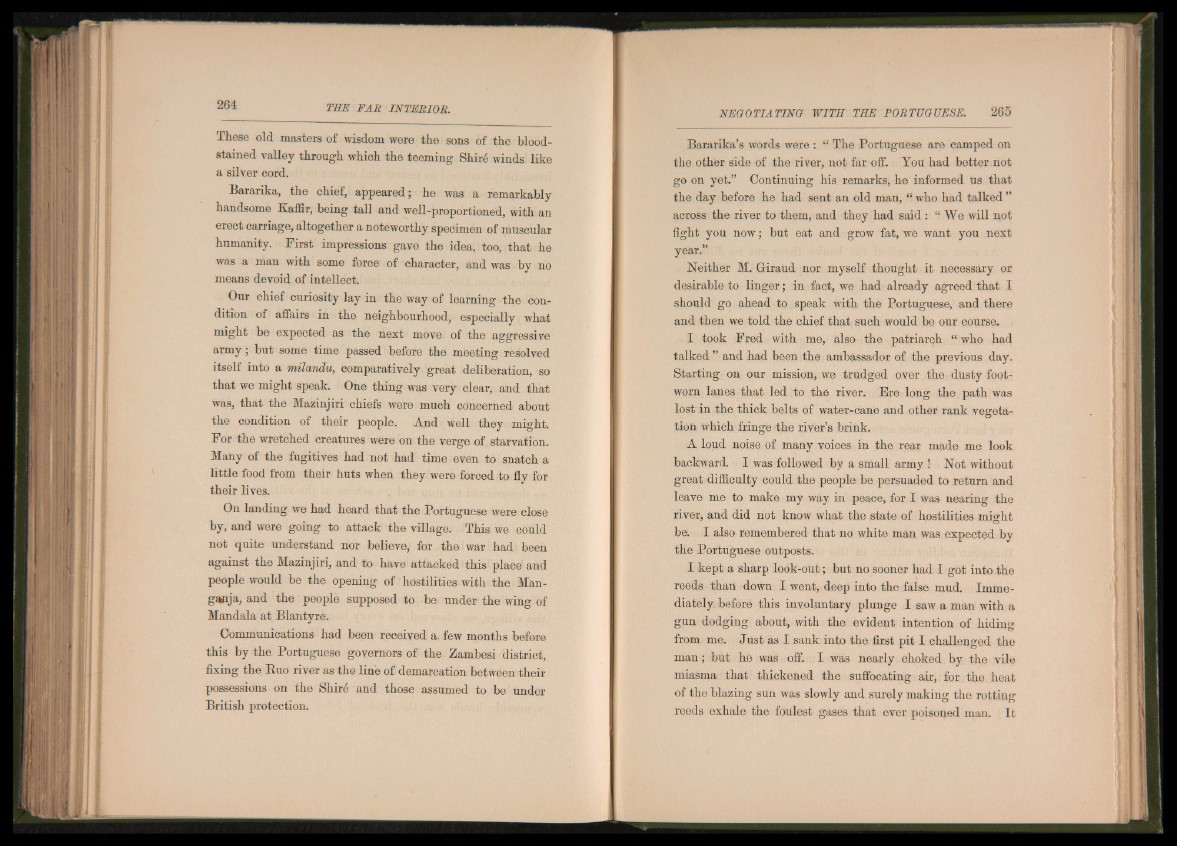
These old masters of wisdom were the sons of the bloodstained
valley through which the teeming Shire winds like
a silver cord.
Bararika, the chief, appeared; he was a remarkably
handsome Kaffir, being tall and well-proportioned, with an
erect carriage, altogether a noteworthy specimen of muscular
humanity. First impressions gave the idea, too, that he
was a man with some force of character, and was by no
means devoid of intellect.
Our chief curiosity lay in the way of learning the condition
of affairs in the neighbourhood, especially what
might be expected as the next move of the aggressive
army; but some time passed before the meeting resolved
itself into a milancLu, comparatively great deliberation, so
that we might speak. One thing was very clear, and that
was, that the Mazinjiri chiefs were much concerned about
the condition of their people. And well they might.
For the wretched creatures were on the verge of starvation.
Many of the fugitives had not had time even to snatch a
little food from their huts when they were forced to fly for
their lives.
On landing we had heard that the Portuguese were close
by, and were going to attack the village. This we could
not quite understand nor believe, for the war had been
against the Mazinjiri, and to have attacked this place and
people would be the opening of hostilities with the Man-
ganja, and the people supposed to be under the wing of
Mandala at Blantyre.
Communications had been received a. few months before
this by the Portuguese governors of the Zambesi district,
fixing the Buo river as the line of demarcation between their
possessions on the Shire and those assumed to be under
British protection.
Bararika’s words were : “ The Portuguese are camped on
the other side of the river, not far off. You had better not
goon yet.” Continuing his remarks, he informed us that
the day before he had sent an old man, “ who had talked ”
across the river to them, and they had said : “ We will not
fight you now; but eat and grow fat, we want you next
year.”
Neither M. G-iraud nor myself thought it necessary or
desirable to linger; in fact, we had already agreed that I
should go ahead to speak with the Portuguese, and there
and then we told the chief that such would be our course.
I took Fred with me, also the patriarch “ who had
talked ” and had been the ambassador of the previous day.
Starting on our mission, we trudged over the dusty footworn
lanes that led to the river. Ere long the path was
lost in the thick belts of water-cane and other rank vegetation
which fringe the river’s brink.
A loud noise of many voices in the rear made me look
backward. I was followed by a small army ! Not without
great difficulty could the people be persuaded to return and
leave me to make my way in peace, for I was nearing the
river, and did not know what the state of hostilities might
be. I also remembered that no white man was expected by
the Portuguese outposts.
I kept a sharp look-out; but no sooner had I got into .the
reeds than down I went, deep into the false mud. Immediately.
before this involuntary plunge I saw a man with a
gun dodging about, with the evident intention of hiding
from me. Just as I sank into the first pit I challenged the
man; but he was off. I was nearly choked by the vile
miasma that thickened the suffocating air, for the heat
of the blazing sun was slowly and surely making the rotting
reeds exhale the foulest gases that ever poisoned man. It